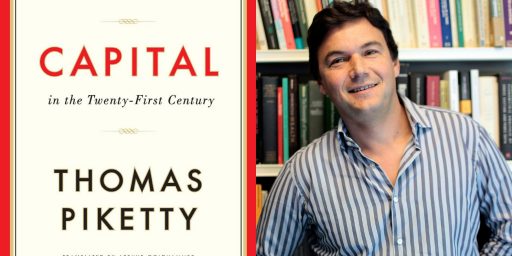The Inequality Divide
Greg Mankiw has two quotes that highlights the differences on inquality between the “Right” and the “Left”,
[T]he challenge for policy is not to eliminate inequality per se but rather to spread economic opportunity as widely as possible.–Ben Bernanke
An unequal society cannot help but be an unjust society.–Brad DeLong
Mankiw then goes on to ask,
The key question: To what extent is inequality of outcomes a source for concern in and of itself? People will always differ in productivity. Should policymakers act to offset these innate differerences, or should their goal be to give everyone the same shot and not be surprised or concerned when outcomes differ wildly?
Well part of the issue is that there is an incentive problem here. Eliminating all inequality is not a desirable outcome because we live in a world of imperfect and asymmetrical information. As I have argued in the past, from an incentive stand point some level of income inequality is necessary.
The problem can be cast as an incentive problem which is precisely how Jean-Jaques Laffont and David Marimort cast it in their new book The Theory of Incentives: The Principal Agent Model. Moral hazard, or hidden action, problems are quite common. How does a supervisor get a worker to put forth his best effort? How does an insurance company induce drivers to drive safely? How does the government achieve income equality without diminishing work effort? This latter one is the problem with income redistribution schemes. The naive approach of say giving each person a fixed dollar amount results in some people providing no work effort and a drop in output. Thus, if one is going to favor income redistribution, then it seems to me it is incumbent on that person to at least spend some time looking at the issue from an incentives stand point.
[…]
When work effort is unobservable, then you have a problem of moral hazard–i.e, hidden action, that requires an additional constraint: the incentive compatibility constraint. Basically, if you want to ensure that there is no work effort at all you solve for the first best solution in which case no work effort is expended. The second best solution incorporates the incentive compatibility constraint which is to ensure that people at least put forward some work effort. Even in this case, insurance in not complete, i.e. you still have income inequality, and you also get less work effort than in the first best situation. In other words, just as with insurance markets that have deductibles to help seperate high risk from low risk customers, you have transfers/taxes that do not eliminate inequality. The inequality provides and incentive to expend work effort.
Now the question becomes one of how much inequality is necessary? Theoretically it depends on the parameters of the model. Looking at different countries wont necessarily be of any help here since individuals in different countries will probably have different utility functions (i.e., preferences). So just because country X has inequality at one level does not necessarily mean that is the level of inequality country Y should strive for.
[…]Another problem comes from political pandering. While it is all nice and neat to talk about the theory of how to achieve income redistribution while being aware of the incentive problem, there is also the potential pitfall of politicians using income redistribution for political gain (i.e., retaining an elected office). This itself can be viewed as an incentive problem as well. How do the voters ensure that their elected official votes for the best feasible outcome? Further, when we look at government today do we see results that are the second best results? While the second best results are sub-optimal they are the best feasible results. Is this what we are observing with government today? Was the energy bill a second best outcome? Was the Prescription Drug Bill for Seniors a second best outcome? So while, we can theoretically outline how these things should be done, it is far from clear that our current government is structured in a way that can achieve them.
For Brad DeLong he will just have to accept the fact that he is going to have to live in a fundamentally unjust country, if not the entire world.





The ‘left’ stare through other peoples eyes, pain, stroke, and arrange shower accidents. They’re biggots too in their own safe, little, lucifer world; so why can’t Hillary be President?
Steve; On what might we base the premise that inequality [in and of itself] is unjust? I would maintain that it is not. However; injustice might be attained when the method used to obtain inequality is unjust.[like outright theft]
On the other hand it may be argued that an unjust action[like progressive taxation] may not result in injustice! So, where lies the objective determination of the premise?
You talk as if someone (other than God) can eliminate all inequality of outcome or at least reduce it significantly. To have a serious discussion you have to show that it is possible; perhaps you can give a clear example of an alternative to the US economy (please don’t tell me that your alternative is Sweden). if it is not possible, there is no need to discuss trade offs.
In relation to your reference to Laffont-Martimort textbook, the theory of incentives (or contracts) is about specific contractual situations and can hardly be extended to the analysis of a government’s pervasive intervention to reduce inequality of outcome (you can check this by looking at the more advanced parts of Bolton-Dewatripont’s textbook).
Professor DeLong seems to believe that some people should have some of their freedoms taken away so that he and his utopian statist friends can feel better about the world they live in. Of course, he and his utopian statist friends get to choose which freedoms are taken from whom.
No thanks. I still think Adam Smith’s invisible hand is vastly preferable to any utopian statists quite visible hand in managing human affairs, and I think history has validated this point over and over and over.
Earth to Brad Delong.
We are all equal, here in the US and around the world , in our common humanity. Equality starts, develops, and ends there. The rest is is left up to the individual to pursue his endeavors and the rest of us to treat them humanely.
What your question really comes down to, in the end, he is one that we discussed here several times; the question of equality of opportunity, versus the quality of outcome. Brad, unfortunately, hasn’t managed to drag himself away from holding the latter the higher.
Edgardo,
Sorry, I disagree with your assesment. Sure we can get equality of income. Take all the income, divide by the population, distribute accordingly. Of course, we then have the incentive problem that Laffont and Martimort discuss and which you toss aside.
Equality of outcome, taken to its extreme, gives us governments like the old Soviet Bloc of yesteryear, North Korea and Cuba of today, and oppressive theocracies past and present . Except for a very few in those countries, everyone else is equal in their misery.
“Equality, rightly understood as our founding fathers understood it, leads to liberty and the emancipation of creative differences; wrongly understood, as it has been so tragically in our time, it leads leads first to conformity and the to despotism.”
Barry Goldwater
On the other hand it may be argued that an unjust action[like progressive taxation] may not result in injustice!
Progressive taxation, of the sort we have here in the US in not under any definition unjust, it is simply requiring a high level of taxation from those who have more to protect. It’s like saying that charging a person more money to heat a 3000 sq foot home then a person with a 1000 sq ft home is unjust.
I we had true equality of opportunity, few would disparage unequal distribution of wealth.
Rick,Of course it is. Progressive taxation puts a greater non-proportional burden on someone simply as punishment for earning more. A “just” tax would only charge ten times as much tax on ten times as much income.[assuming such a thought as a “just tax” is not an oxymoron]
It may be that the resulting “ends” justify the “means” in the minds of some, but the principle “means” is certainly objectively unjust.